Passover this year was unusual in many respects. While I am not Jewish and don’t observe the day, nor do most of the people at Virginia Tech; an unlikely visitor reminded us of the key message of Passover- Freedom and Liberation. This visitor was Father Joseph Philippe from the University of Fondwa, Fondwa, Haiti. He came on a mission to educate, inspire and also acquaint the audience of the challenges to higher education in Haiti.
Father Joseph spoke of the Judaic notion of “Tikkun Olam,” or healing the world. “As human beings, we are all responsible for each other. We must help, stand by and support one another through difficult times and heal each other’s hearts,” he said. Going back to his own story of how he got into humanitarian action, he added:” I come from a very poor family and my mother was a street vendor. I saw poverty around me and struggled to bring myself up and educate myself. This quest lead me to become an Accountant and then a Priest. I realized early on that the main thing in life is to realize and be grateful for everything we have.”
His life-work seems to be testimony to this positive attitude, as Father Joseph is the founder of Fonkoze, a microcredit institution and also the founder of University of Fondwa in Haiti. Higher education has especially taken a hit in Haiti, following the 2010 Earthquake. Pointing to the key challenges, he said:”Some of the challenges before us are basic: infrastructural and human resources. Since so many of the talented people died in the Earthquake and others fled, we are in dire need of people who have education and talents, to serve.”
While his pitch to recruit volunteers was strong and he recommended that anyone wanting to volunteer must come with the mindset of a warrior, so as to be ready for anything; he was also aware that this is not for everyone. “I don’t want to create a new class of poor people, in the effort to remove poverty in Haiti. We need your help and will gladly give you any position that matches your qualifications or experience, but ask that you provide for your own salaries, as we don’t have the money to do that.” He pointed out.
While the debate rages on about how development aid is channeled and used or abused, the fact remains that the situation in Haiti, especially in Haiti is quite dire.
Higher education in Haiti
His visit also points to the recent efforts by academics and humanitarians to address the needs for higher education in post-conflict and post-disaster zones. A recent report by Teacher’s college, Columbia University points out:” Given the severity and duration of these social upheavals, and the current state of human security around the globe, international and local actors have argued persuasively for turning attention to education. Education, they assert, can be a way to mediate conflict, and education services should be included in humanitarian aid packages, together with water and food, shelter, and medical treatment (Aguilar & Retamal, 1998; Johannessen, 2001; Machel, 2001; Save the Children Alliance, 1996; Sinclair, 2002). Backing this policy change, several international organizations have designed a number of education “tool kits” and other materials to assist humanitarian workers, educators, teachers, parents, and community members in providing education services during a complex emergency (Nicolai, 2003; Pigozzi, 1999; Triplehorn, 2001)[1].”
Another report published in 2010 detailed the destruction of the close to 30 universities in Port Au Prince, which were already dilapidated and were not in very good shape to begin with[2]. Some of the recommendations include creating online classes for Haitian students, to enable them to graduate, and also to provide them access to online journals, to make up for the lack of libraries in Haiti. There is a growing demand for support to local institutions, rather than offering opportunities to students to leave Haiti. Brain-drain is also identified as a negative consequence of the fellowships and scholarships offered by western institutions.
While there are a vast array of factors that have made the situation what it is, Haitian state-making failure is underwritten by a complex array of destructive local and external institutions, as well as natural constraints, including class, lack of elite cohesion, geography, population growth, the social origins of the Haitian polity, imperialism, and technology.
The solution to Haiti’s problems may not be simple, but they are within reach. What is needed is a strategic push, as this report by INURED points out. A combination of grassroots, government and international NGO efforts can help build Haiti, in the longterm. But as Father Joseph pointed out, it is the actions of every individual that count, in this case.” The individual who wants to transform himself through service is the one we are looking for. You will find your new self, a self that is bigger, greater and more generous than what you are today. Come, work with us to find that new self.” He pointed out.
About Father Philippe
Father Joseph B. Philippe, CSSp, founded Fonkoze in 1994 and continues to serve as Coordinator of Fonkoze, President of Fonkoze Financial Services, and a Board Director of Fonkoze USA.Father Joseph is also the founder of the Peasant Association of Fondwa (APF) and has been its coordinator since 1988. As part of the APF, Father Joseph established and helps manage numerous commercial projects, including an agricultural, reforestation and animal husbandry project, a bakery, a guest center/educational tourist program and a restaurant, as well as an auto parts shop, a guest house, a cement store and a scaffolding rental company. In 2004, Father Joseph also founded the University of Fondwa, an educational institution committed to sustainable and integrated development in rural Haiti.

